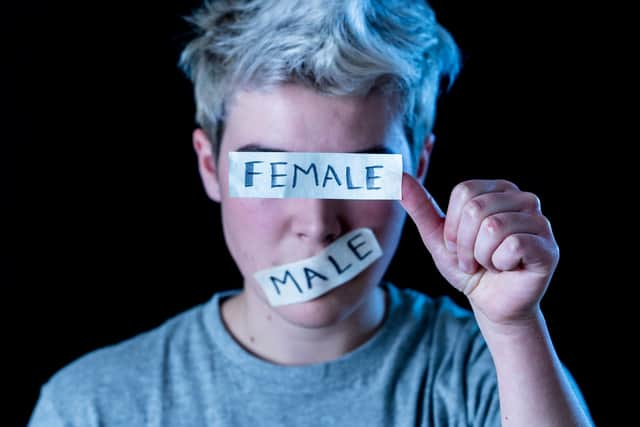Gender Scotland row: Which other countries have gender self-identification laws?
"It was pretty cutting edge,” says Kyle Knight, senior researcher at Human Rights Watch. “I love to celebrate Nepal as an extreme success. It was really creative and brave at the time. I think a lot of us in North America and Europe don't realise that a lot of the early progress on this issue actually comes from the global south.”
The ruling, which meant that Nepalese citizens could have their official documents altered to reflect the gender they chose based on “self feeling” alone, came about after human rights activist and budding politician Sunil Pant filed a petition in Nepal’s Supreme Court. His petition demanded official recognition of sexual and gender minorities and the rights in the wake of the civil war and resulting peace deal in his country.
Advertisement
Hide AdAdvertisement
Hide AdThe judge assigned to the case was Bala Ram KC, who had studied natural resources law at the University of Dundee. In a 36-page document, he ruled that all discriminatory laws relating to sexual orientation and gender identity should be scrapped. It also acknowledged the option of a “third gender”, which is marked as “O” or “other” on documents.


Mr Knight admits there have been some “hiccups along the way” for Nepal, due to the way in which the issue was implemented through a court ruling – but says many countries have a lot to learn from its action.
"In terms of the actual declaration from government - or in this case [Nepal], the court and the implementation by government - it was as early as 2007 that you had legal entities saying that there should be a self declaration model,” he says. “But fast forward to now and you still see a real mixed picture around the world.”
Five years after Nepal’s ruling, Argentina became the first country to pass parliamentary legislation on self-declaration their own gender identity when it passed its Gender Identity Law.
Gender self-identification, where no judge or medical expert are involved in a decision to change gender, is part of the law in around 15 to 20 countries – depending on how laws are interpreted.


In 2015, a Council of Europe report called for urgent and transparent processes to enable easy access to documents such as IDs and birth certificates for people who had changed gender, propelling reforms in many countries. Now, ten countries in Europe – Belgium, Denmark, Finland, Iceland, Ireland, Luxembourg, Malta, Norway, Portugal and Switzerland - have adopted a self-determination approach. Others, including Germany, Sweden, Spain and the Netherlands, are considering similar legislation.
Mr Knight says change in Europe has often been slow.
"In a lot of Europe, the governments dial back the requirements: what they'll do is they'll get rid of the surgical requirement and then go through another process to get rid of the psychiatric evaluation requirement and slowly chip away at it,” he says.
As Scotland debated its Gender Recognition Reform Bill, which was passed in Holyrood in December but has since been controversially blocked by the UK Government, Victor Madrigal-Borloz, the United Nations human rights expert on gender identity, warned that all countries should allow self-identification of gender.
Advertisement
Hide AdAdvertisement
Hide AdCurrently, individuals in the UK must have had a diagnosis of “gender dysphoria” as well as having undergone or be undergoing treatment “for the purpose of modifying sexual characteristics”.
“United Nations human rights bodies that have spoken on the matter have constantly found that legal recognition of gender identity through self-identification is the most efficient and appropriate way to ensure the enjoyment of human rights, and I am yet to learn of a country in which this is not the case,” he said.
Naomi McAuliffe, Scotland programme director of Amnesty International, said countries around the world were increasingly adopting such legislation.
She said: “While the 2004 Gender Recognition Act was an important step forward at the time, there has been further progress at the international level and now Scotland and the UK lag behind. There is a clear movement in Europe and around the world, towards self-determining systems of gender legal recognition and that is where developments in best practice, human rights standards and law are heading."
Finland, which has long been a comparison to Scotland, with its similar sized population, female leader and progressive policies, passed its own trans rights law just last week – something which Sanna Marin had described as a “priority” for her government.
Helsinki’s new law – passed by 113 votes to 69 earlier this month, was opposed by some Centre Party politicians as well as the far-right Finns Party and religious Christian Democrats. It removes the requirement for trans people to be sterilised and obtain a psychiatric diagnosis in order for them to obtain legal gender recognition. Recognition of the new gender will be available for adults upon written application after a mandatory 30-day “period of reflection”.
Ms McAuliffe added: “Indeed, when Holyrood passed the Gender Recognition Reform Bill, it was welcomed by Dunja Mijatovic, the Commissioner for Human Rights at the Council of Europe. We would have been the 10th Council of Europe country with self-ID, but that has now been claimed by Finland which passed reforms last week. Our hope is that Scotland and the rest of the UK will rejoin the trend for LGBT progress soon.”
More than a decade after its self-identification legislation was passed, Argentina’s stance on trans issues is “still considered the gold standard among activists around the world”, according to Maria Sjödin of advocacy group OutRight Action International. It is considered an unlikely pioneer. A Catholic country, and the birthplace of Pope Francis, it has long been regarded as a conservative nation – yet has cemented its position as a leader in promoting trans rights.
Advertisement
Hide AdAdvertisement
Hide AdA year after the Gender Identity Law was passed, a six-year-old girl named Luana, who was designated male at birth, became the first transgender child in Argentina to have her new name officially changed on her identity documents. Meanwhile, last year, it passed a requirement for one per cent of Argentina's public sector jobs to be reserved for transgender people.
Yet, despite its legislation, trans people in Argentina often face discrimination and persecution. In Argentina, the life expectancy for a trans person stands between 35 and 41, according to the UN, around half the life expectancy of 77 for the general population.
Following in the footsteps of Nepal, a self-determination law passed in India in 2014, also went one step further, reflecting the role of people of a third gender, known as “hijra”, in Indian society. A hijra, a person whose gender identity is neither male nor female, has had a long held position in Indian history and folklore, with some people believing they have the ability to bless or curse.
Human rights activists praised the ruling as “beginning the process of re-establishing the important social role that third-gender people played in traditional Indian society”.
Comments
Want to join the conversation? Please or to comment on this article.